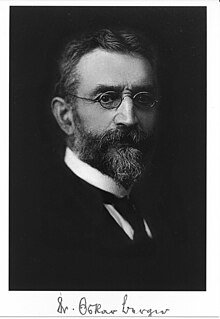Oskar Berger
Gustav Oskar Berger (born April 10, 1862 in Torgau , † September 18, 1934 in Mühlhausen ) was a German gymnastics teacher and functionary. From 1919 to 1929 he was chairman of the German Gymnastics Association .
Life
Berger was born the son of a postal secretary and attended high schools in Torgau and Sangerhausen . Berger was a gymnast as a student. He studied mathematics and physics in Leipzig . He also trained as a gymnastics teacher. During his studies in 1880 he became a member of the Normannia Leipzig fraternity . He graduated in 1885 with the promotion of Dr. phil. from. He then worked as a high school teacher in Magdeburg , from 1887 at the König-Wilhelms-Gymnasium and later at the Domgymnasium . From 1912 to 1914 he was senior director of studies at the Stephaneum in Aschersleben .
In addition, he was involved in various functions as a gymnast and promoted school gymnastics. He also campaigned for women's gymnastics. He increasingly took on supra-regional functions in the German Gymnastics Association . Politically, he was set national liberal and was a patron of the German Navy League . At the First World War Berger took three years partly as a battalion commander.
From 1919 to 1929 he was chairman of the German Gymnastics Association . In his era in 1922, the so-called clean separation between ball sports, especially soccer, and gymnastics falls . The traditional, politically nationally oriented association attitude did not change. However, the association was built on a democratic basis. The association with millions of members could no longer be run on a voluntary basis, so that Berger took a leave of absence as a teacher in order to lead the organization based in Berlin full-time. He represented the German gymnastics community in numerous associations and authorities. He was a member of the Reich Advisory Board for Physical Exercise, Vice Chairman of the Reich Committee for Physical Exercise and Advisory Board of the Prussian Ministry of Science, Art and Education.
In 1929 he did not run again and has lived in Mühlhausen ever since.
Honors
- Honorary member of the German Gymnastics Association
- Honorary citizen of Freyburg an der Unstrut
- In 1935 Professor-Berger-Strasse in Mühlhausen was named after him.
literature
- Helge Dvorak: Biographical Lexicon of the German Burschenschaft. Volume I Politicians, Part 1: A – E. Heidelberg 1996, p. 82.
Web links
| personal data | |
|---|---|
| SURNAME | Berger, Oskar |
| ALTERNATIVE NAMES | Berger, Gustav Oskar (full name) |
| BRIEF DESCRIPTION | German gymnastics teacher and functionary |
| DATE OF BIRTH | April 10, 1862 |
| PLACE OF BIRTH | Torgau |
| DATE OF DEATH | September 18, 1934 |
| Place of death | Mühlhausen / Thuringia |
